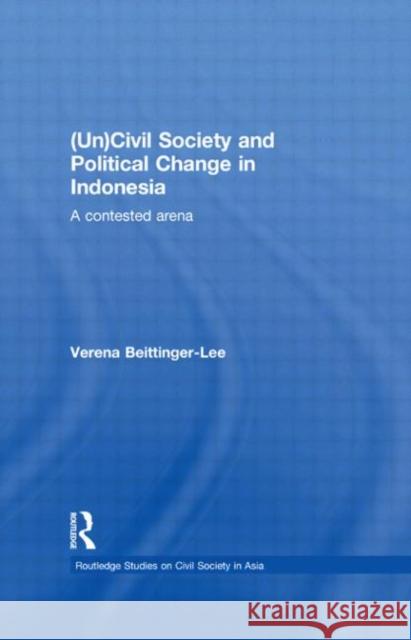(Un) Civil Society and Political Change in Indonesia: A Contested Arena » książka
(Un) Civil Society and Political Change in Indonesia: A Contested Arena
ISBN-13: 9780415547413 / Angielski / Twarda / 2009 / 298 str.
(Un) Civil Society and Political Change in Indonesia: A Contested Arena
ISBN-13: 9780415547413 / Angielski / Twarda / 2009 / 298 str.
(netto: 699,68 VAT: 5%)
Najniższa cena z 30 dni: 705,23
ok. 22 dni roboczych.
Darmowa dostawa!
(Un) Civil Society and Political Change in Indonesia provides critical analysis of Indonesia's civil society and its impact on the country's democratization efforts that does not only take the classical, pro-democratic actors of civil society into account but also portrays uncivil groups and their growing influence on political processes. Beittinger-Lee offers a revised categorization of civil society, including a model to define the sphere of 'uncivil society' more closely and to identify several subcategories of uncivil society. This is the first book to portrays various uncivil groups in Indonesia, ranging from vigilantes, militias, paramilitaries, youth groups, civil security task forces and militant Islamic (and other religious) groups, ethnonationalist groups to terrorist organizations and groups belonging to organized crime. Moreover, it provides the reader with an overview of Indonesia's history, its political developments after the democratic opening, main improvements under the various presidents since Suharto's fall, constitutional amendments and key reforms in human rights legislation. This book will be of interest to upper level undergraduates, postgraduates and academics in political science and Southeast Asian studies.
This book is a critical analysis of Indonesia’s civil society and its impact on the country’s democratization efforts that does not only take the classical, pro-democratic actors of civil society into account but also portrays uncivil groups and their growing influence on political processes. In the wake of democratic opening, not only pro-democratic civil society organizations have mushroomed in the country, but ‘uncivil’ society groups have come increasingly to the fore as well. On the non-state level, violence is executed by self-protection groups, militias, fundamentalist religious groups, terrorist groups, and many more.
The book analyses the framework for the development of civil society in Indonesia: the past and present political system and its implications for (civil) society, the role religion (and in particular Islam)play in Indonesia, the state of democratic culture, ethnic and other identities and the advancement of human rights. It draws an overall picture of Indonesia's associational life and the dynamics between its actors after 1998 and introduces some actors of both ‘civil’ and ‘uncivil’ society while answering questions about the nature of interaction between civil society and state as well as within civil society. Finally the book illustrates that an opening up of the public sphere and the rise of civil society can have negative impacts on democratization processes as well.
This book will be of interest to upper level undergraduates, postgraduates and academics in political science and Southeast Asian studies.











